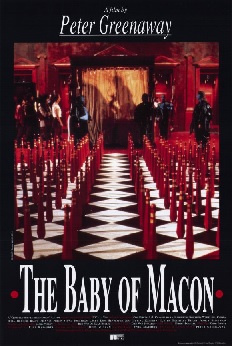 🍿🍿🍿🍿🍿🍿🍿🍿 | 🎙️ EPISODE 427: 03.22.22 𝐏𝐚𝐫𝐭 𝐨𝐟 𝐭𝐡𝐞 𝟏𝟎-𝐕𝐨𝐥𝐮𝐦𝐞 RANKING GREENAWAY 𝐒𝐞𝐫𝐢𝐞𝐬 Eschewing the post-production editing tricks of recent work, Greenaway's 7th narrative feature still exists at the same stylistic crossroads of this time period. Its large-scale sets feel oddly claustrophobic and while this is not based on an existing text such as Prospero's Books, it is still a film about the production of a play. It's a meta, purely theatrical work set in the court of the fictional Cosimo Medici wherein actors perform a parable about a baby born in the town of Mâcon that has been infertile for a generation. It gets savagely, unnervingly meta. |
The best elements in this film happen in the slow, methodical unpeeling of its meta narrative. That you are watching a play inside a movie isn't meant to be hidden, but the edges between what's happening in the play world of the movie and the movie world of the film you're watching start to blur at an exponential rate. There is also a fascinating subtext about patronage in the arts, how much control over what happens should be dictated by the guy footing the bill?
Everything culminates with a brutal gang rape and the mutation of a child, naturally. The ghoulish mom is revealed to be a beautiful blonde in costume. And together the actors of the play and the audience members inside the movie bow in tandem towards us, the viewer, breaking down all walls and/or highlighting that the constraints of this medium (film) are, and always have been, impenetrable.
CHRONOLOGICALLY
⫷ EPISODE 427B - (YOU ARE HERE) - EPISODE 428 ⫸
⫷ EPISODE 427B - (YOU ARE HERE) - EPISODE 428 ⫸
The Baby of Mâcon is a 1993 film written and directed by Peter Greenaway starring Ralph Fiennes, Julia Ormond and Philip Stone. The film is set in France during the mid-17th century, in the court of Cosimo III de' Medici as he and his court watch actors perform a parable about a baby born in the town of Mâcon whose inhabitants have been infertile for a generation. The birth of the baby boy is mythologized for various ends, initially because it marks the end of childlessness in a city. The film premiered at the 1993 Cannes Film Festival. Because of the many scenes of nudity and the graphic scenes of violence the film struggled to find distribution. It was not shown in the U.S. until 1997. It was released on November 11, 1993.

0 comments:
Post a Comment